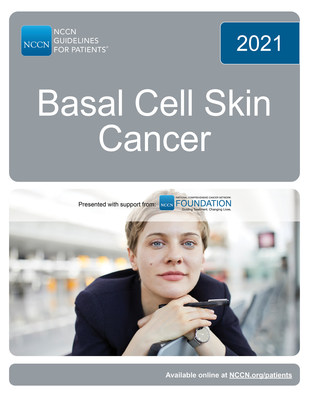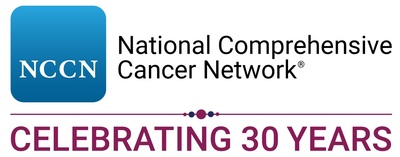New NCCN Guidelines for Patients: Basal Cell Skin Cancer empowers patients and caregivers with knowledge about this widespread, preventable, and easily-cured cancer plus the rare subset that requires more aggressive treatment.
PLYMOUTH MEETING, Pa., Oct. 13, 2021 /PRNewswire/ -- The National Comprehensive Cancer Network (NCCN) today announced the publication of new NCCN Guidelines for PatientsBasal Cell Skin Cancer (also known as basal cell carcinoma, or BCC), the most common form of skin cancer. This highly curable type of cancer is diagnosed in more than two million people in the United States every year-which is more than all other cancers combined.1 BCC primarily impacts lighter-skinned, sun-exposed people over age 60, due to the buildup of sun exposure over the years. However, skin cancer has recently become more common in younger people, likely as a result of them spending more time in the sun. In very rare instances untreated BCC can progress significantly and be life-threatening. This new resource provides trustworthy information based on the latest evidence, available free online at NCCN.org/patientguidelines thanks to funding from the NCCN Foundation.

"I am grateful to see these new and comprehensive guidelines for BCC," said Kathy Barnard, Founder of the Save Your Skin Foundation. "Last year, when I was diagnosed with advanced basal cell carcinoma, I did not know where to turn. I got very little information from my doctor and did not understand the procedures they prescribed and the painful surgeries I received. Thankfully, patients going forward will be able to rely on the information in this book to help them understand and navigate their diagnosis and treatment options."
The treatment recommendations explained in the NCCN Guidelines for Patients are based on the NCCN Clinical Practice Guidelines in Oncology (NCCN Guidelines), which are updated frequently by multidisciplinary teams of experts from across NCCN Member Institutions. The patient versions present unbiased expert guidance in an easy-to-read format-with clear language, charts, images, and a glossary of medical terms.
"Most BCC patients can be cured with a simple surgical excision, and some tumors can even be treated with topical creams. However, a very small subset of cases can spread. These patient guidelines help people know the difference," explained Chrysalyne D. Schmults, MD, MSCE, Associate Professor of Dermatology, Harvard Medical School, Vice-Chair of Surgical Oncology, Brigham and Women's Department of Dermatology, and Chair of the NCCN Guidelines Panel for Non-Melanoma Skin Cancer. "We recommend people try to avoid sunburns and suntans by limiting their sun exposure and using sunscreen. They should talk to their doctor if they notice something on their skin that looks like a pimple but bleeds or doesn't heal within six weeks."
Panel Vice-Chair, Rachel Blitzblau, MD, PhD, Associate Professor, Director of Radiation Oncology for Breast Cancer, Duke University Medical Center, agreed: "The most important thing to look for is anything new or changing on your skin. Examples include a new colored patch or bump, shiny bumps or nodules, open areas that won't heal, an area with a raised rolled edge (sometimes with crusting in the center), or a white waxy scar-like area. I would encourage everyone to bring anything new or changing on their skin to the attention of their primary doctor-or their dermatologist if they have one-for further evaluation."
The growing library of NCCN Guidelines for Patients includes more than 55 books for patients and caregivers covering most major types of cancer, along with topics like managing cancer-related distress, nausea and vomiting, and survivorship (both healthy living & cancer-related late and long-term effects), plus special considerations for adolescents and young adults across all cancer types. Free digital versions are available at NCCN.org/patientguidelines and via the NCCN Patient Guides for Cancer App. Printed versions are available for a nominal fee at Amazon.com.
Learn more and help support these and other resources for people with cancer and their caregivers at NCCN.org/patients.
About the National Comprehensive Cancer Network
The National Comprehensive Cancer Network (NCCN) is a not-for-profit alliance of leading cancer centers devoted to patient care, research, and education. NCCN is dedicated to improving and facilitating quality, effective, efficient, and accessible cancer care so patients can live better lives. The NCCN Clinical Practice Guidelines in Oncology (NCCN Guidelines) provide transparent, evidence-based, expert consensus recommendations for cancer treatment, prevention, and supportive services; they are the recognized standard for clinical direction and policy in cancer management and the most thorough and frequently-updated clinical practice guidelines available in any area of medicine. The NCCN Guidelines for Patients provide expert cancer treatment information to inform and empower patients and caregivers, through support from the NCCN Foundation. NCCN also advances continuing education, global initiatives, policy, and researchcollaboration and publication in oncology. Visit NCCN.org for more information and follow NCCN on Facebook @NCCNorg, Instagram @NCCNorg, and Twitter @NCCN.
About the NCCN Foundation
The NCCN Foundation was founded by the National Comprehensive Cancer Network (NCCN) to empower people with cancer and advance oncology innovation. The NCCN Foundation empowers people with cancer and their caregivers by delivering unbiased expert guidance from the world's leading cancer experts through the library of NCCN Guidelines for Patients and other patient education resources. The NCCN Foundation is also committed to advancing cancer treatment by funding the nation's promising young investigators at the forefront of cancer research. For more information about the NCCN Foundation, visit NCCN.org/patients.
1 Siegel RL, Miller KD, Jemal A. Cancer statistics, 2016. CA Cancer J Clin 2016;66:7-30. Available at http://www.ncbi.nlm.nih.gov/pubmed/26742998.
Media Contact:
Rachel Darwin
267-622-6624
darwin@nccn.org

Photo - https://mma.prnewswire.com/media/1657526/Cover_Basal_Cell_2021.jpg
Logo - https://mma.prnewswire.com/media/441768/NCCN_Logo.jpg

